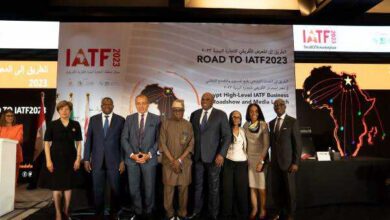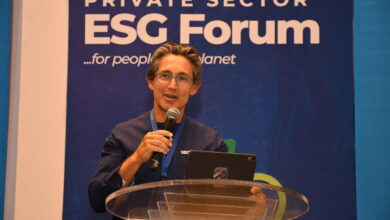Environmentalists task BATN on afforestation in Oke-Ogun for decades of depleted ecosystem
Insist we need food, not tobacco

By Edu Abade,
Environmental activists have charged the British America Tobacco Nigeria (BATN) to embark on massive afforestation to make up for the decades of depleted ecosystem where it has been engaged in activities that led to deforestation in Oke-Ogun, Oyo State over the years.
This was the verdict of the activists, who converged on Lagos on the sidelines of this year’s World No Tobacco Day marked on May 31, 2023, annually to create awareness of the harms caused by tobacco products to people, public health, communities, the environment and as recent evidence has shown in global climate.
Director of Programmes, Corporate Accountability and Public Participation Africa (CAPPA), Philip Jakpor, who spoke in company of Dr. Olayinka Oyegbile of Development Strategies and Policy and Research Officer of CAPPA, Zikora Ibeh, gave the charge at a media roundtable to mark the 2023 World No Tobacco Day in Lagos, insisting that the consumption of tobacco products had constituted serious health risks to smokers in Nigeria and the entire world.
He recalled that member states of the World Health Organisation (WHO) organised the first commemoration of the World No Tobacco Day in 1987, which has since become a yearly event that provides opportunity for collaborative actions to address the tobacco menace.
“The commemoration draws attention to the widespread prevalence of tobacco use and to its negative health effects, which currently lead to more than 8 million deaths each year worldwide, including 1.2 million as a result of non-smokers being exposed to second-hand smoke.
“This year’s theme: We Need Food, Not Tobacco, encourages governments to focus on providing the ecosystem for farmers to grow sustainable food crops instead of tobacco. Governments are equally charged to end subsidies for tobacco growing and use savings for crop substitution programmes that improve food security and nutrition,” he said.
CAPPA also pointed out that the WHO is also raising awareness on the ways the tobacco industry interferes with attempts to substitute tobacco growing with sustainable crops, thereby contributing to the existing global food crisis.
“For us at CAPPA, the theme aligns with our conviction, which is supported by science, that tobacco cultivation processes from clearing of large tracts of land, cutting of trees for tobacco curing and cigarette manufacturing, also contribute to the climate crisis and ultimately, threaten food security.
“Encouraged by the theme, we decided to do something different this year. We decided to visit tobacco-growing communities in Oyo State to interact with farmers and see for ourselves what the environment looks like.
“Our findings which are captured in the audio-visuals that will be relayed after this exchange, motivates us to demand that the Nigerian government should accelerate the implementation of Articles 17 and 18 of the WHO Framework Convention on Tobacco Control (WHO-FCTC) and its guidelines that outline how farmers can be supported from tobacco growing to sustainable alternative crops,” the group stated.
Speaking further, Jakpor stated that the guidelines provided opportunities for technical advice on agriculture to farmers, linking them to necessary supplies and services to support their agricultural production, providing financial support to increase production of healthy food, and divesting away from tobacco towards alternative crops.
In its recommendations, the group maintained that it was time to incentivise farmers to quit tobacco Farming, adding: “Today, as we mark the WNTD 2023, we support theme of this year: We Need Food, Not Tobacco. The experiences shared by former tobacco farmers from Oke-Ogun highlight the truth of how the tobacco industry often treats the crucial contributors to the industry’s global supply chain as disposables.
“Time and time again we have underscored the harmful realities of tobacco cultivation. From cultivation which involves the use of pesticides that are harmful to tobacco growers, to the cutting and burning of trees for tobacco curing, which leads to deforestation (about 3.5 million hectares of land are destroyed each year) and the use of large quantities of water to cultivate tobacco, the health of man and the ecosystem is negatively impacted, and climate resilience reduced. Food security issues follow quickly.
Read also: Second edition of Ecobank Adire Lagos Experience begins June 9
“Regrettably, the largest tobacco cultivation occurs in economically challenged African nations such as Malawi. It's a bitter irony that while these countries, including Malawi, Mozambique, and Nigeria, produce tobacco leaves that fuel the multi-billion- dollar tobacco industry, they still grapple with food imports.
The group lamented that its field visit to Oke-Ogun remains its own way of obtaining first-hand information on what farmers experience as a foundation in supporting them to make the right demands.
It explained that the visit painted a vivid and distressing picture of the hardships faced by the local farming community due to the decline of tobacco cultivation adding that with BATN’s sudden disengagement from Oke-Ogun, the former tobacco farmers were left with no option but to venture into other sustainable alternatives without adequate support.
“Another profound concern is the lingering health issues among the farmers due to years of exposure to tobacco and its associated chemicals. With limited access to healthcare, these concerns remain largely unaddressed with many of these farmers resorting to inappropriate and ineffective traditional measures to manage their tobacco-induced health complications.
“Most of the farmers are plagued by lingering health issues due to years of exposure to tobacco and related chemicals. Limited healthcare access further compounded the problem, with some of them resorting to ineffective traditional methods to manage their tobacco-induced health complications,” it stated.
The group, therefore, recommended that the Federal Government should provide substantial support to farmers in their transition from tobacco farming to other crops. This could include financial aid, affordable agricultural loans and insurance products to give farmers the financial means to move to new crops and protect them from unforeseen losses.
CAPPA also recommended investigating the disengagement contracts BAT Nigeria signed with local tobacco farmers in view of a breach of the terms which some of the farmers alleged, disclosure of the total acreage allocated to tobacco farming in Oke-Ogun and the whole country, as well as compelling BAT Nigeria to carry out a verifiable afforestation programme in the Oke-Ogun axis to make up for decades of its vastly depleted ecosystem.
Others are support for the establishment of farmers’ cooperatives to bolster their collective bargaining power when negotiating prices for crops and insulate them against market fluctuations, and support for crop diversification programmes that could provide farmers with alternatives to tobacco farming.
“The programme would provide resources to farmers to grow crops that are not only profitable but also sustainable and beneficial for the health of the land and people. The selection of these crops should take into consideration local soil, climate conditions, and market demand.
“Investment in local infrastructure such as irrigation systems, storage facilities, and transportation networks to aid the farming community aimed at making farmers to cultivate their crops more efficiently and facilitate access to markets and improve the bargaining power of farmers.
“Adequate health services should be provided in Oke-Ogun Community, especially for old former tobacco farmers, while focusing on the prevention and treatment of diseases caused by tobacco farming, which will include regular health check-ups, provision of personal protective equipment and health education,” it added.
Click on The Trumpet and follow us on our Twitter page for more:




